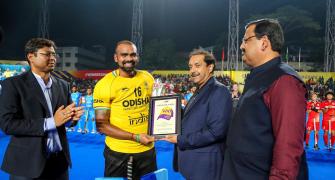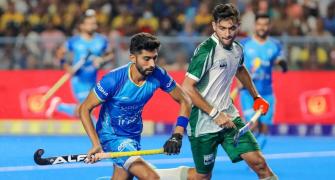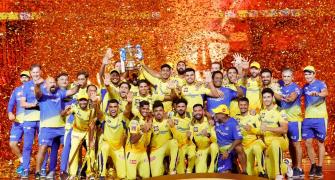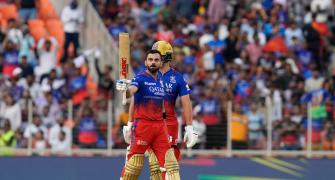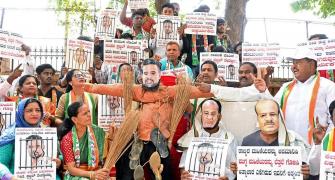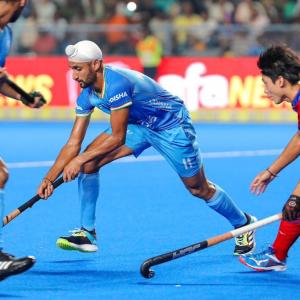While the Indian women's football team holds the 60th position in the FIFA rankings, the men's team ranks 100.
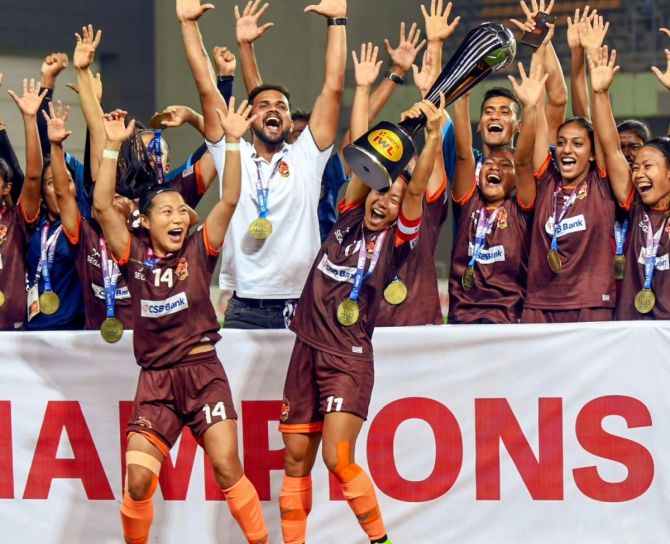
When the Indian men's football team won the South Asian Football Federation (SAFF) Championship, beating Kuwait 5-4 in a nail-biting penalty shootout in Bengaluru, several of the country's celebrities including top sportspersons took to social media to send congratulatory messages.
Just two months earlier, a contrasting story had played out in Ahmedabad when the Gokulam Kerala FC won the Indian Women's League (IWL), one of the country's top women's sporting events. The victory went practically unnoticed.
One could argue that the IWL was a domestic event, unlike SAFF, where the men's team was pitted against Bangladesh, Nepal, Bhutan, the Maldives, Pakistan and Sri Lanka. But then, the women's team are SAFF champions too, having won the first four of its five women's editions played so far.
When it comes to salaries, prize money and exposure, women's football in India is treated quite differently from men's.
IWL winners Gokulam Kerala, for instance, were handed out a cheque of Rs 10 lakh (Rs 1 million).
Compare that to what the winners of the men's Indian Super League (ISL) get: A whopping Rs 6 crore (Rs 60 million).
The IWL winners, in fact, were awarded less than half of what the fourth placed team in the men's I-league got (Rs 25 lakh/Rs 2.5 million).
The cheque was handed over at a ceremony in Ahmedabad, Gujarat, where, after clicking a few pictures, the players were guided off the makeshift stage, the branding signages were turned around and the IWL logos were blocked.
What was to be the prize distribution ceremony for the IWL ended up becoming an awards function for the Gujarat State Football Association Club Championship, a men's event.
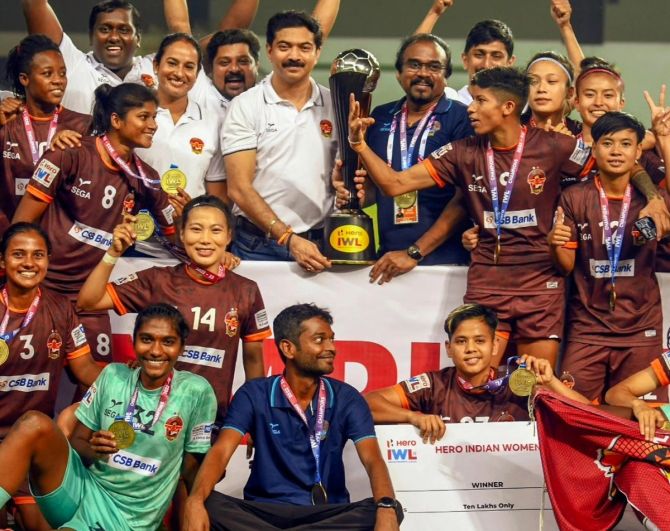
As the FIFA Women's World Cup, a footballing extravaganza played every four years, ends this week, the difference in the treatment of Indian men and women's football remains as wide as their rankings.
While the Indian women's football team holds the 60th position in the FIFA rankings, the men's team ranks 100, a spot it climbed to on June 29 with its win in the SAFF Championship.
The women's team hasn't qualified for the FIFA World Cup, and there could be reasons for that.
"The men's team plays tournaments at different levels throughout the year, which help hone its skills. The women get to play only three tournaments: Senior Women's National Football Championship, the Under-17 Nationals and the IWL," says Sujata Kar, a former player with the women's national team. "If women get the same exposure, our performance will be far better."
"When I was playing in the UK, they had 30 games that were played domestically. In addition to that, they also play 20 games for the national team," adds Ngangom Bala Devi, a forward with the Indian women's national team and the first Indian woman to score in a professional football league in Europe.
"So, they play 50 games across the year. Here we have barely three months of training and playing."
Then there is the issue of pay disparity, not just in India but globally. Last month, FIFA said that every player from the 32 teams participating in the 2023 World Cup would earn $30,000.
The players from the winning team would take back $270,000, part of the $110 million prize pool -- a 300 per cent jump from the 2019 edition.
The total prize money awarded for the Men's World Cup, meanwhile, was four times that -- $440 million.
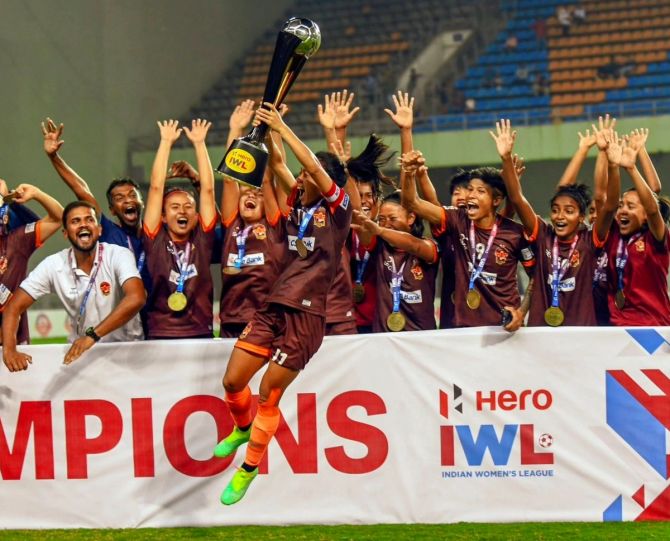
In India, media coverage also eludes women's football.
The notice for broadcasting the IWL was published on April 21, just five days before the tournament started.
The bidding closed on April 24, with two potential broadcasters in the running.
Eventually, a day before the league kicked off, the All India Football Federation (AIFF) announced that its YouTube channel would live stream the matches, and that too only those matches played at 4:30 in the evening. Those played at 8:30 in the morning weren't streamed.
This wasn't the only issue.
"We have to reach the ground two hours before a match begins, and it took us an hour to get to the stadium (in Ahmedabad)," says Devi, India's highest scorer.
So the players had to start for the stadium by 5 in the morning. "Plus, at times we had a game the very next day."
A number of players also complained about substandard accommodation, with some of the teams put up nearly 30 km from the venue.
They also said that an all-vegetarian meal would be served to them in a pandal set up outside the hotel.
AIFF officials did not respond to Business Standard's queries.
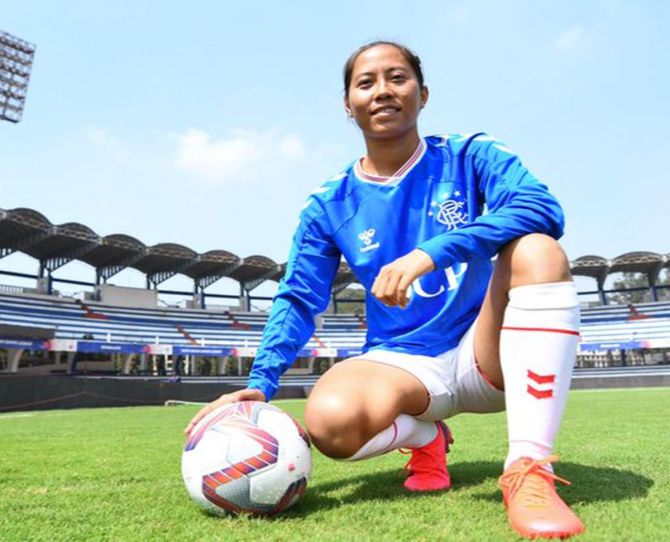
A former player with the national women's football team says that the matches should not have been held in summer. "Hopefully, things will improve next year," she adds.
"The league could have been organised in a better way. It was very demanding on the players' health, physical and mental," says Dalima Chhibber, a defender with the national team.
"All of us struggled a little, injuries were more frequent, and nutrition and stay were not up to the mark."
Kar says that when she used to play, they would have a camp for four months. "We also had practice games with other countries. Now, the players are called 20-30 days prior to the tournament and get less practice."
The former national team player quoted above says that several of the elite players are training on their own, using their own equipment.
"We need to ensure that those who play in the leagues abroad also get to train with the upcoming players," she adds.
The field needs to be laid from the ground up, says Chhibber, complete with women coaches, educators and referees. And it needs to be levelled for men and women.
Feature Presentation: Rajesh Alva/Rediff.com


